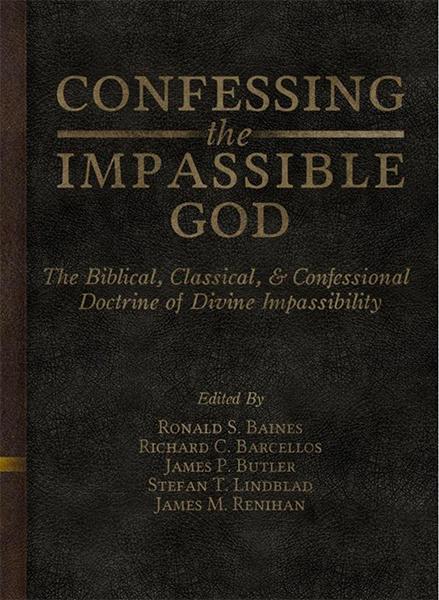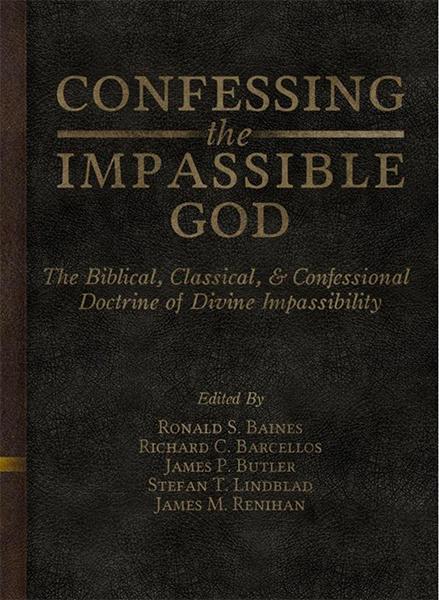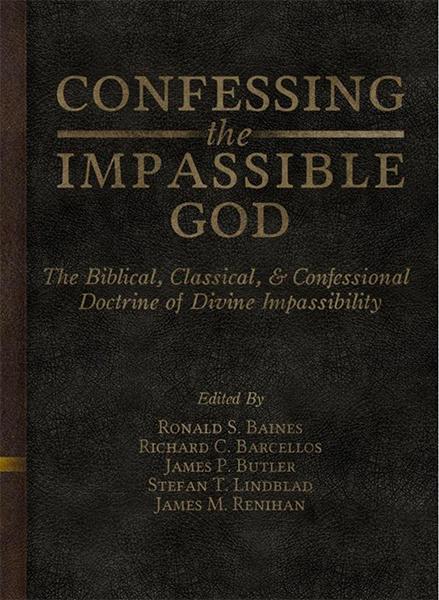Confessing the Impassible God: The Biblical, Classical, & Confessional Doctrine of Divine Impassibility
Baines, Ronald S., Barcellos, Richard C., Butler, James P., Lindblad, Stefan T. and Renihan, James M.
Publisher's Description
The book is structured as follows. The Introduction presses home the importance of the doctrine of divine impassibility. Readers will be challenged to recognize that tinkering with divine impassibility as classically understood has implications that always end up compromising other fundamental articles of the Christian faith.
The main argument is contained in seven parts. Part I (chapters 1-2) addresses vital issues of prolegomena. Prior to providing a positive explication of the doctrine, we outline our theological method. . . .
Part II (chapters 3-7) covers the Old and New Testaments. Though all potential passages of Scripture are not discussed, the most important texts on the subject of divine impassibility are addressed. The order of these chapters reflects our hermeneutical method . . .
Part III (chapters 8-9) surveys the history of the doctrine of divine impassibility. We seek to demonstrate that what was once a catholic doctrine has become muddied as scholars of various theological traditions have reformulated, modified, and in some instances rejected classical theism’s commitment to divine impassibility.
Part IV (chapters 10-12) offers a systematic-theological approach to the subject. It assumes Parts I-III and builds upon them. Careful discussion is provided on such issues as the relationship of divine impassibility to the essence and attributes of God, the divine affections, and the incarnation of the Son of God. . . .
Part V (chapter 13) offers an overview of the doctrine of divine impassibility as contained in the Second London Confession of Faith (1677/89). This confessional document asserts the same doctrine as the Westminster Confession of Faith (1647) and the Savoy Declaration (1658) on the issue of divine impassibility.
Part VI (chapter 14) seeks to explicate the practical theology of divine impassibility. It draws out implications of the doctrine under the topics the saving knowledge of God, the Christian life, worship, and pastoral ministry.
Part VII (chapter 15) offers closing comments and a list of affirmations and denials in light of the entire study.
Additionally, we have included two appendices, containing book reviews of contemporary attempts to modify the classical doctrine of divine impassibility.
We offer this book, not as the end of discussion on this vital issue, but as a continuation of an older discussion that has been largely lost in our day. . . . We are of the firm opinion that the methodological, hermeneutical, and theological shifts that took place after the ascendancy of the Enlightenment steered theology in the wrong direction.
The editors wish to thank several readers who assisted us along the way. Their insights helped tighten the over-all argument and presentation of the book. We are especially grateful to Paul Helm for writing the Foreword. We asked Professor Helm to write it because we knew he would read carefully and provide a very informed and helpful perspective for prospective readers. Cameron Porter deserves special recognition for his stellar work on the cover and formatting the book for print.
It is our prayer that the following pages will contribute to fruitful thought and discussion concerning the doctrine of divine impassibility and other related doctrines of the Christian faith. ~ the Editors, from the Preface
-
Cover Type
-
ISBN
-
Page Count
-
Weight
-
Publisher
-
Publication Date




